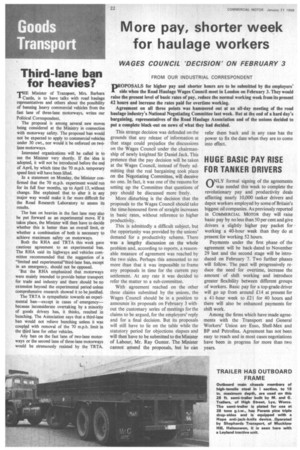Third-lane ban for heavies?
Page 24

If you've noticed an error in this article please click here to report it so we can fix it.
THE Minister of Transport, Mrs. Barbara Castle, is to have talks with road haulage representatives and others about the possibility of banning heavy commercial vehicles from the fast lane of three-lane motorways, writes our Political Correspondent
The proposal is among several new moves being considered at the Ministry in connection with motorway safety. The proposed ban would not be expected to apply to commercial vehicles under 30 cwt., nor would it be enforced on twolane motorways.
Interested organizations will be called in to see the Minister very shortly. If the idea is adopted, it will not be introduced before the end of April, by which time the 70 m.p.h. temporary speed limit will have been lifted.
In a statement on Monday, the Minister confirmed that the 70 m.p.h. experiment would run for its full four months, up to April 13, without change. She explained that to alter it in any major way would make it far more difficult for the Road Research Laboratory to assess its results.
The ban on heavies in the fast lane may also be put forward as an experimental move. If it takes place, the Minister will then have to decide whether this is better than an overall limit, or whether a combination of both is necessary to achieve maximum safety on motorways.
Both the RHA and TRTA this week gave cautious agreement to an experimental ban. The RHA said its highways and vehicles committee recommended that the suggestion of a "limited and experimental"third-lane ban, except in an emergency, should not be opposed.
'But the RHA emphasized that motorways were mainly intended to provide better transport for trade and industry and there should be no extension beyond the experimental period unless comprehensive research showed it to be justified.
The TRTA is sympathetic towards an experimental ban—except in cases of emergency— because inconsiderate overtaking by a minority of goods drivers has, it thinks, resulted in bunching. The Association says that a third-lane ban would not relieve bunching unless it was coupled with removal of the 70 m.p.h limit in the third lane for other vehicles.
Any ban on the fast lane of two-lane motorways or the second lane of three-lane motorways would be strenuously resisted by the TRTA.




















































































































